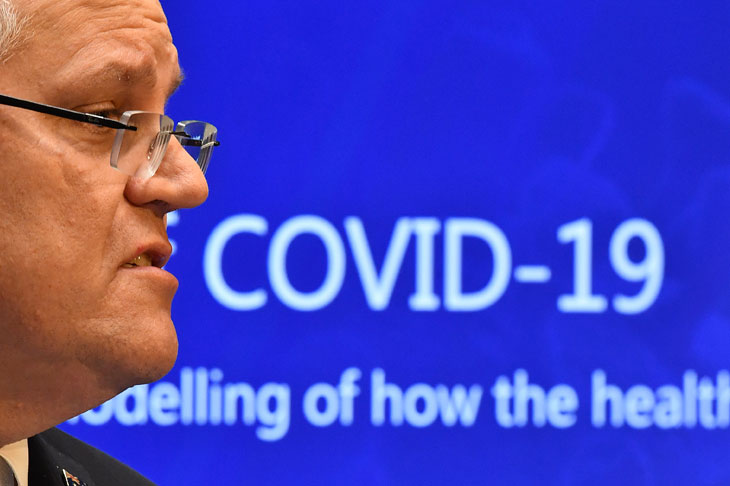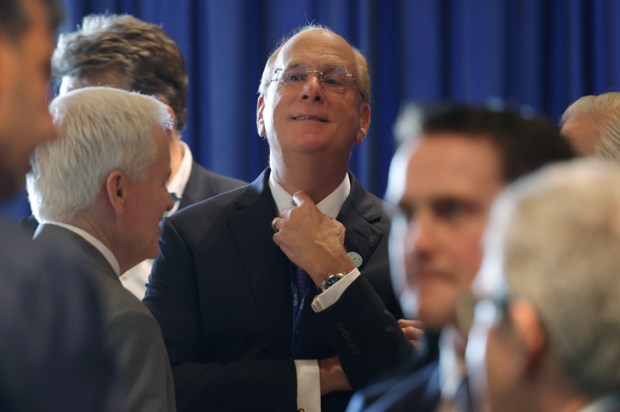Our prime minister continues to outsource key decisions about how to address the Sars-CoV-2 pandemic to his trusted inner sanctum of medical experts. To defy his Chief Medical Officer Brendan Murphy and the Australian Health Protection Principal Committee would be both career and electoral suicide.
Morrison is in a tight spot. He cannot appear to be less cautious than his premiers or other world leaders. But as Geoffrey Luck highlighted in Quadrant, initial modelling sought by the Commonwealth Department of Health from the Peter Doherty Institute in Melbourne grossly overestimated the impact of coronavirus on the health system, presumably because it based its calculations on worst-case scenarios from Wuhan province. Their modelling assumed that 89 per cent of the population would become infected and of these 38 per cent would require medical care, meaning that we would require 35,000 ICU beds. At time of writing, only 239 have been hospitalised nationally, of whom 81 are in ICU. In a cheeky post hoc ergo propter hoc credit grab, the government was quick to draw a straight line between its restrictions and these unexpectedly good outcomes.
For how long does the PM imprison an entire population? Does he wait until complete disappearance of the virus? The Grattan Institute naively believes that the New Zealand approach of complete lockdown should be adopted until we have zero cases. Sydney’s population alone exceeds that of New Zealand by about 200,000. All else being equal, the virus is more likely to gain traction here. Morrison’s Kiwi counterpart intends to quarantine her country until a vaccine is available; something which may not happen in the foreseeable future, if at all.
Economics editor for the ABC, Emma Alberici, infamously tweeted early in this pandemic that we should ‘stop talking about the economy’ (ironically disobeying her own injunction). Worryingly, key experts from our health bureaucracies also believe that talk of lifting restrictions is strictly off-limits. Many see the health of economies and the health of the population as competing concerns rather than indivisible partners. They are not only blind to the inevitable economic catastrophe that awaits us, but also to the cumulative social, medical and psychiatric costs of lockdown. Let’s not forget that male suicide rates peaked in Australia after the Great Depression at 28.1 per 100,000. They currently stand at 18.7 per 100,000. What is going to happen to these rates over the next few years? What will happen to the prevalence of crime, alcoholism and domestic violence if we stay the current course? It’s all well and good for government to earmark funds for these problems after the fact; but surely relaxing restrictions promptly is the simplest way to avoid these unintended consequences of current policy? Each additional day of indefinite shutdown exacerbates the insidious stresses caused by the sudden and indefinite suppression of healthy human interaction. Why is the government not modelling the public health outcomes of prolonged states of (confected) dread? Who of us has had a sound night’s sleep since this saga began? What are the long-term costs of school closures on the healthy psychological development of children, or on family cohesion?
This manifest lack of proportionality reflects the worst authoritarian excesses and collective neuroticism of influential health authorities. The all-or-nothing approach to policy is no surprise to anyone who has worked in public healthcare. Hospitals and local health districts are top-heavy, sclerotic autocracies. Micromanagement, rule by committee and communication with staff via diktat are the order of the day. These inflexible structures and practices are now being imposed on the whole country and will be difficult to dismantle.
Common sense and pragmatism are easily displaced by hysteria. A preoccupation with safety at all costs rather than accepting real-world trade-offs too readily dictates health policy. We should remember the panic in the UK over foot and mouth in the early 2000s. Overly cautious modelling undertaken by Professor Neil Ferguson at Imperial College (who is currently advising the UK on coronavirus) resulted in the unnecessary culling of millions of cattle and sheep at a cost of 10 billion pounds. The same academic warned that that up to 150,000 people could die from mad cow disease; an estimate now judged to be wildly pessimistic.
Expertise in viruses is not necessarily generalisable to other spheres of knowledge or human endeavour. Neither does possessing a degree in public health or epidemiology confer immunity from group-think or from other cognitive biases. Medical practice is reflexively defensive. A justified fear of medical negligence claims can lead to irrational and even harmful interventions. Examples include low-yield investigations for non-specific symptoms, the over-prescription of antibiotics and misplaced medical heroism; i.e the pursuit of the prolongation of life at all costs, rather than the alleviation of suffering. The archetypally obsessional personality profile of many doctors promotes the overestimation of risk and intolerance of ambiguity. A drive to maintain ‘control’ over all aspects of patients’ treatment might be an adaptive temperamental characteristic in the day-to-day practice of medicine, but is not necessarily the best way to run a country.
To compound matters, many doctors I know are unaware of their economic illiteracy and incuriousness. Scepticism of private enterprise is widespread in medicine. The government’s conspicuous display of largesse in the forms of wage subsidies and quantitative easing will only reinforce the assumption that public resources are limitless. Public hospitals and healthcare services are ultimately dependent on private enterprise for their operation. It’s no surprise that countries with basket case economies, like Italy, also have failing healthcare systems.
Unlike the prime minister, public health experts are in an unassailable position. Their jobs and reputations are guaranteed. If infection rates fall, this confirms evidence of the efficacy of lockdown, quarantine and social distancing. Conversely if rates rise, this also proves the need for the prolongation of such measures. NSW Chief Health Officer, Dr Kerry Chant intimated that a baseline of restrictive measures in NSW will continue for 12 months, and that ‘certain rules may be lifted, only to be re-applied if there is a corresponding rise in cases.’ The most terrifying aspect of this pandemic is that doctors could have sole access to the on/off switch of our nation’s economy for the foreseeable future. At some point soon, the PM needs to listen to other voices.
Got something to add? Join the discussion and comment below.
Get 10 issues for just $10
Subscribe to The Spectator Australia today for the next 10 magazine issues, plus full online access, for just $10.
You might disagree with half of it, but you’ll enjoy reading all of it. Try your first month for free, then just $2 a week for the remainder of your first year.














Comments
Don't miss out
Join the conversation with other Spectator Australia readers. Subscribe to leave a comment.
SUBSCRIBEAlready a subscriber? Log in